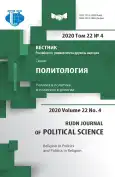Islam and Politics in Indonesia
- 作者: Setiawan R.1, Esti M.2, Sidorov V.V.1
-
隶属关系:
- Kazan Federal University
- Bandar Lampung University
- 期: 卷 22, 编号 4 (2020): RELIGION IN POLITICS AND POLITICS IN RELIGION
- 页面: 731-740
- 栏目: CHALLENGES OF THE ISLAMIC WORLD
- URL: https://journal-vniispk.ru/2313-1438/article/view/322193
- DOI: https://doi.org/10.22363/2313-1438-2020-22-4-731-740
- ID: 322193
如何引用文章
全文:
详细
作者简介
Refly Setiawan
Kazan Federal University
Email: refly@ubl.ac.id
Master’s Program Student, Department of Political Science 18, Kremlevskaya St, Kazan, 420008, Russian Federation
Melinda Esti
Bandar Lampung University
Email: estimelinda1987@gmail.com
Associate Professor, Department of Public Administration 29, Labuhan Ratu, Kec. Kedaton, Kota Bandar Lampung, Lampung, 35142, Indonesia
Viktor Sidorov
Kazan Federal University
Email: viktor.sidorov@kpfu.ru
Associate Professor, Department of Political Science 18, Kremlevskaya St, Kazan, 420008, Russian Federation
参考
- Tulus W. Political Development Critical Reflections on Crisis. Yogyakarta: BIGRAF Publishing; 2011 (In Indon.).
- Carillo B. Our Political Goals. Jakarta: Lappanas; 2016 (In Indon.).
- Anwar S. Islamic Thought and Action in Indonesia: A Political Study of New Order Muslim Scholars. Jakarta: Paramadina; 2017 (In Indon.).
- Askuri & Joel C.K. An orientation to be a good millennial Muslims: state and the politics of naming in islamizing Java. Indonesian Journal of Islam And Muslim Societies. 2019; 9 (1): 31-55. doi.org/10.18326/ijims.v9i1.31-55.
- Haryono A. Behind the Birth of a Nation and Country. Jakarta: UI Press; 2017 (In Indon.).
- Imaa M. Al-Islam waushul al-Ahkam li Ali Abd al-Raziq. Bandung: Grafindo Persada; 2014 (In Indon.).
- Rahman B. Religion and State in Islam: an analysis of the Sunni Siyasah Fiqh. Contextualization of Islamic Doctrine in History. Jakarta: Paramadina; 2017 (In Indon.).
- Wahid A. State and Cultural Struggles. Depok: Desentara; 2001 (In Indon.).
- Ma’arif S. Ground Islam. Yogyakarta: Pustaka Pelajar; 2015 (In Indon.).
- Miriam B. Fundamentals of Political Science. Jakarta: Gramedia; 2008 (In Indon.).
- Suseno F. Political Ethics Basic Moral Principles of Modern State. Jakarta: Gramedia; 2017 (In Indon.).
- Creswell J.W. Research design: qualitative, quantitative, and mixed approaches. Yogjakarta: PT Pustaka Pelajar; 2010 (In Indon.).
- Moleong L. Qualitative Research Methodology. Bandung: Remaja Rosda Karya; 2013 (In Indon.).
- Noer D. Introduction to Political Thought. Jakarta: Rajawali Press; 2010 (In Indon.).
- Thahir T. Political, Cultural and Economic Democracy. Jakarta: Paramadina; 2014 (In Indon.).
- Firmanzah. Political Party Management. Jakarta: Yayasan Obor Indonesia; 2008 (In Indon.).
- Biglari A. Political Equality and The Issue of Citizenship Rights in Contemporary Islamic Thought. Journal of Islamic Political Studies. 2019; 1 (2): 77-102. doi: 10.22081/jips.2019.68396.
- Madjid N. Islamic Intellectual Property. Jakarta: Bulan Bintang; 2011 (In Indon.).
- Munawir. Scholars and Community Religiosity. Jakarta: Paramadina; 2013 (In Indon.).
- Robert W.H. Which Islam? Whose Shariah? Islamization and citizen recognition in contemporary Indonesia. Journal of Religious And Political Practice. 2018; 4 (3). 278-296. doi.org/10.1080/ 20566093.2018.1525897.
- Muhammad S.I. & Nursiha B.A. Islamic Brand: A Conceptual Definition of Brand from Islamic Perspective. Journal of Islamic Studies and Culture. 2016; 4 (2): 59-71. doi: 10.15640/jisc.v4n2a6.
- Haris S. Parties, Elections and Parliaments in the Reform Era. Jakarta: Yayasan Pustaka Obor Indonesia; 2014 (In Indon.).
- Yukihiro Y. The effects of bureaucracy on political accountability and electoral selection. Journal Elsevier/European Journal of Political Economy. 2018; 51 (1): 57-68. doi.org/10.1016/j.ejpoleco.2017.03.009.
- Suryadi B. Political Sociology: History, Definition and Development of Concepts. Yogyakarta: IRCiSoD; 2007 (In Indon.).
- Boisard M. Humanism in Islam translated by H.M. Rasjidi. Jakarta: Bulan Bintang; 2010 (In Indon.).
- Kencana I.S. Introduction to Political Science. Bandung: Pustaka Reka Cipta; 2009 (In Indon.).
补充文件









